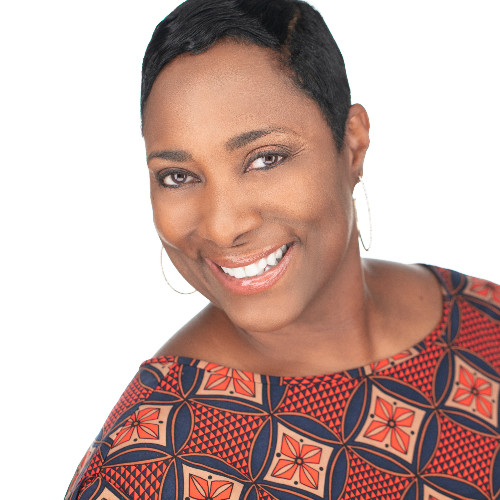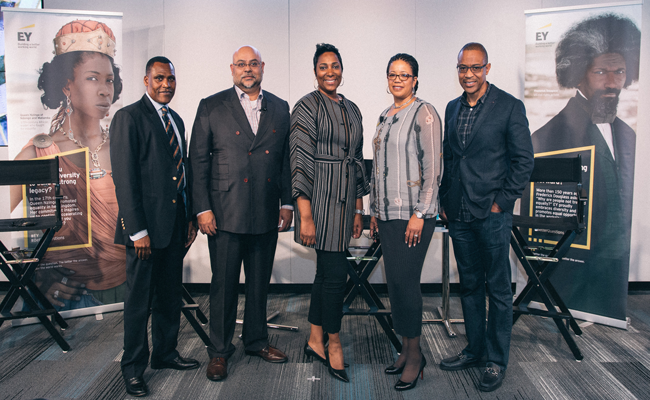The Business of Belonging
At LinkedIn, we want to ensure that every member of our team, feels like they belong and that each of us appreciates and values all of our colleagues’ uniqueness and creativity. So it was only fitting that in celebration of Black History Month, our Black Inclusion Group hosted an all Black executive roundtable, in partnership with EYs Black Professional Network, on ‘The Business of Belonging.’ The evening featured a thought-provoking panel discussion on what it means to belong and some of the challenges faced by Black professionals in the workplace. My hope is that the stories that we shared will help others remove their masks and unleash their full potential.
I was fortunate to be a member of the panel this year along with Warren DeSouza, CFO of Aimmune Therapeutics, Yvette Hollingsworth Clark, Chief Compliance Officer, Wells Fargo and Hugh Molotsi, Founder and CEO Ujama Inc. The discussion focused on Diversity, Inclusion and Belonging (DIBs), but more specifically belonging in the workplace. Panelists were asked to share what belonging means to them, and to share examples of when they felt like they did or didn’t belong. Here at LinkedIn, I am fortunate to regularly have meaningful discussions around DIBs and in particular belonging, but in my career that has not always been the case. There were two key events in my career that shifted my experience of belonging.
In 1988 I graduated from the University of Kansas believing that I was unstoppable and that the world would be full of possibilities. I accepted a position as a claims adjuster for a top company, where I was later informed that the entire team which was predominately Black was hired to increase representation. I loved my new job and I was excited to learn and grow. A few months after I joined, my supervisor called a meeting with only the Black members of our team and said, “you guys have to stop congregating and using colloquialisms because you are making these White folks uncomfortable.” I was shocked and it was at that moment the message was clear you don’t belong and you don’t matter. That was the first day I began wearing “the mask,” showing up to work suppressing my authentic self in order to fit in.
In 2010, I was working for a great company in Silicon Valley and was asked by one of the vice presidents I supported to give feedback on how she showed up in her staff meeting. Her style was abrasive and her team was not engaged, so I had to figure out how to deliver the feedback. As an HR professional, part of my role includes coaching and leadership development. Since I was still wearing “the mask,” I packaged all my comments with a neat bow so as not to offend her because I was afraid that if I told her the truth and shared my thoughts, it would not be received well. The messages from my first job were still shaping how I showed up in my current job, that I didn’t matter or belong, therefore my opinions didn’t either. The following weekend I attended a workshop that a dear friend had been encouraging me to attend for some time. The workshop was focused on how to get breakthrough results in your life by figuring out what was really holding you back. In the workshop, I realized that I had let that one message from my past drive my future choices and that was not serving me. In that very moment, I made a different choice to take “the mask” off and be my authentic self. On Monday when I went back to the office, I immediately set up time with the VP in order to give her the feedback she deserved, so she would be in the position to grow and improve. She was grateful and asked me to always give it to her straight and that my feedback and point of view were important because she trusted me and valued my expertise. Until that point, I felt like I had a successful career but I never felt free to be me.
For me, belonging means you see me (the authentic me) and I matter. Since that day I have never worn “the mask,” again and my career has been much more fulfilling as a result.
During the EY Black History Month Executive Roundtable, I was moved to find out that so many others felt they had to wear “the mask” in their workplaces.
The topic of belonging is so important as it can affect employees in so many ways. Events like this are important as they allow black professionals the opportunity to network with others who have similar experiences. Yvette Hollingsworth Clark said, “I may have been the only one in the room, but I needed to be there to help others.” The overwhelming opinion of the panel was that creating a space to have an open dialogue is always a good thing.
There are so many feedback cues that employees will use to determine if they belong: Do I matter? Is my opinion valued? Can I be my authentic self? Will I be accepted? At LinkedIn, we have added a DIBs index to our Employee Voice Survey (EVS). We want to ensure that employees feel they belong and if they don’t we have a way for them to let us know.
Just imagine what could happen if all employees in all companies felt like they belonged. This would unleash their full potential, and they'd all feel empowered to create an environment where everyone feels like they belong. This could be the start of creating a culture of belonging.
#StartSomething
*Photo credit: by Selena DS



